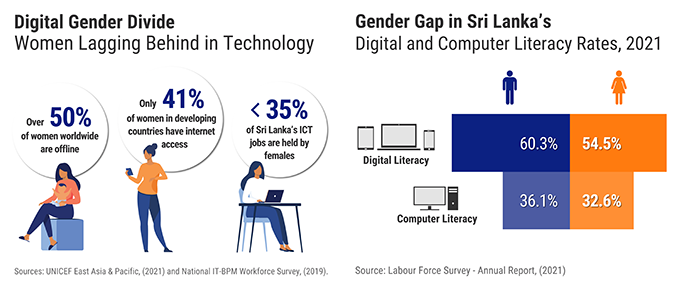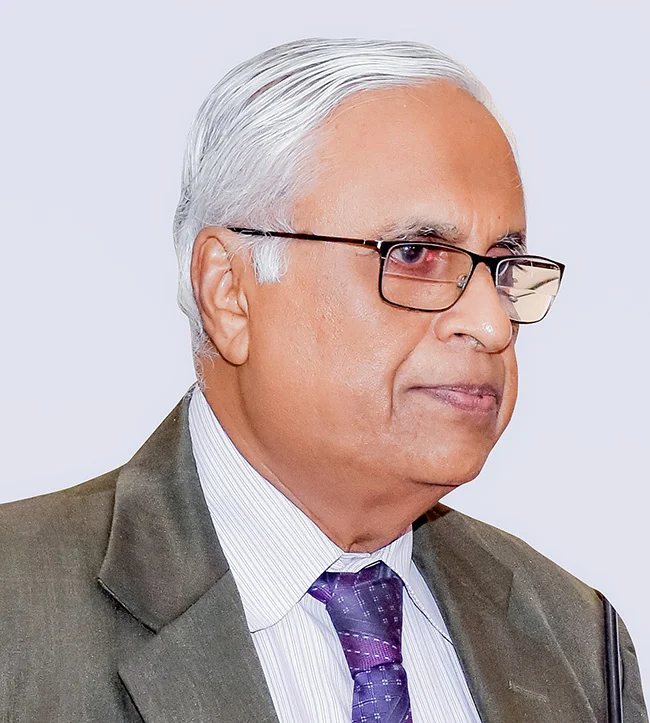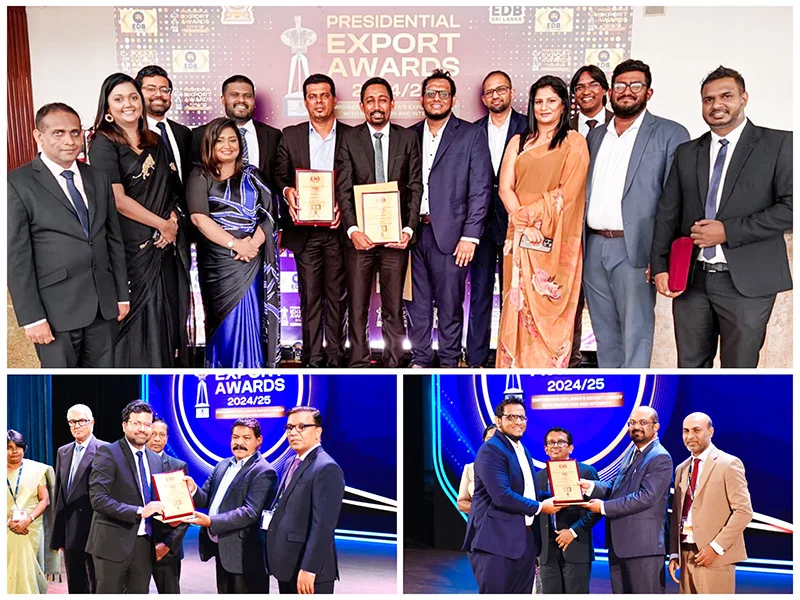Business
DigitALL: Are Sri Lankan Women Abandoned in Digital Transformation?

By Lakshila Wanigasinghe
Written for International Women’s Day on 08 March 2023.
Technology plays an important role in modern society. It connects, innovates, and transforms economies and societies at large. Yet, women and girls continue to have limited access to technology. This gender bias is also present in Sri Lanka, where women comprise of over 50% of the population.
This year, the United Nations marks International Women’s Day with the theme “DigitALL: Innovation and technology for gender equality”, focusing on the digital gender gap’s impact on widening socio-economic inequalities. This blog explores the factors hindering Sri Lankan women’s access to technology and discusses some ways to overcome them.
Digital Gender Divide
The term digital gender divide refers to the gap in digital adoption and use across genders. Findings suggest that more than half of all women worldwide are offline. The gender gap in digital access is wider across developing countries, where the internet penetration rate is 53% and 41% for adult men and women respectively.
COVID-19 emphasised the importance of technology as many government services, education, business, and financial services were performed online during this time. It also confirmed that many groups not only lack access to the digital economy but also resources, technology, and knowledge. In Sri Lanka, only one out of five households owned a desktop or laptop computer in 2021. Less than half of the population used the internet, and email users were even fewer. While Sri Lanka reported a digital literacy rate of 57.2% in 2021, the computer literacy rate was only 34.3%, with females falling behind in both aspects (Figure 1).
Although Sri Lanka’s higher rate of digital literacy comes across as a positive indicator, it is important to note that the measure for digital literacy is an individual’s ability to ‘use a computer, laptop, tablet or smartphone on his/her own.’ However, this measure may not fully reflect true digital literacy as it can also include those who only use smartphones for voice calls. Even against this measure, it is evident that women are underrepresented.
The digital gender divide adversely impacts women’s access to education, health, and financial inclusion. Women and girls face various obstacles, including the limited availability, knowledge, and socio-cultural barriers, which prevent them from fully utilising digital resources. Another deterrent is the high costs associated with digital devices and internet services, especially for rural households. Sri Lanka’s rural and estate sectors lag in digital and computer literacy in comparison to the urban sector. This is likely to have a more significant impact on girls and women in these regions. Further, digital safety concerns relating to cybercrimes, online harassment, greater potential for hate speech, and the overall lack of accountability for such actions discourage some women from using technology entirely.
Closing the Gap
Enhancing Employability Prospects – In today’s growing digital era, the absence of digital literacy and usage will reduce women’s employability prospects further widening gender inequalities. Hence addressing it is crucial to narrowing economic and social inequalities. As the job market shifts towards highly skilled positions, women must adapt and prepare to remain competitive. It can be expected that these jobs will increase more formal employment opportunities and secure forms of income generation. Currently, only 34% of ICT jobs in Sri Lanka are held by females. Increasing female representation the sector will also contribute towards having more role models for girls interested in pursuing similar fields in the future. Thus, shattering the glass ceiling requires immediate action to close the digital gender divide in the long run.
Gender Equality at Work – To address the existing gender bias, policymakers and organisations must work together to establish ‘female-friendly’ policies and programmes. Making women feel welcome and empowered is a good starting point. While addressing gender stereotypes is important, they also need to be coupled with other facilities such as safe transport and flexible work schedules to encourage more women to apply for positions in male dominated fields. This would not only increase the number of women in the field but also help women receive family support to pursue careers in technology.
Empowering Rural Women – It is necessary to provide equal opportunities for women in tech and allow them to grow so that their success can inspire other women to follow suit. This also includes bridging the urban-rural divide in technology access. Hence introducing rural women to digital technology, formal banking and digital financial solutions is important. This could also include specialised training and loan schemes for females interested in entering the technology field. Improving women’s access opens up opportunities for secure financing and a path out of poverty -by engaging in various businesses, especially at a time when e-commerce is popular. These positive economic outcomes can be a game changer for rural female-headed households and Sri Lanka as a whole. Moreover, they can provide small businesses access to international markets if done correctly.
Skill Improvements – Survey findings link higher educational attainment and knowledge in English to greater computer literacy in Sri Lanka. Thus, promoting higher education and English literacy among girls from a young age will prove mutually beneficial in improving computer literacy rates. While ICT is included in the current school curriculum, what is taught at the mandatory level is inadequate. Therefore, it is essential that policymakers update the subject matter to meet the growing digital demand. In line with this, disparities in resource allocations at the school level must also be addressed (such as inadequate availability of computers in smaller schools, absence of computer labs etc.). Encouraging girls to pursue Science, Technology, Engineering and Mathematics (STEM) is critical because ‘there won’t be any women in tech without girls in STEM.’
Given Sri Lanka’s current economic standing, it is also important to consider resource allocations. This is especially concerning allocating funds towards distributing computers to less-developed schools, organising training programs for rural women etc. While these are essential measures in bridging the digital gender gap, implementing any initiatives in stages is best. This will provide a better mechanism to monitor the impact of actions on closing the gap and help adjust course as necessary, without unnecessary waste of scarce resources.
Link to original blog:
https://www.ips.lk/talkingeconomics/2023/03/08/digitall-are-sri-lankan-women-abandoned-in-digital-transformation/
Lakshila Wanigasinghe is a Research Officer at the IPS with research interests in poverty, social welfare, development, education, and health. She holds an MSc in Economics with a concentration in Development Economics and a BA in Economics with concentrations in International, Financial and Law and Economics from Southern Illinois University Carbondale (SIUC), US. (lakshila@ips.lk)
Business
Sri Lanka Customs exceeds revenue targets to enters 2026 with a surplus of Rs. 300 billion – Director General

The year 2025 has been recorded as the highest revenue-earning year in the history of Sri Lanka Customs, stated Director General of Sri Lanka Customs, Mr. S.P. Arukgoda, noting that the Department had surpassed its expected revenue target of Rs. 2,115 billion, enabling it to enter 2026 with an additional surplus of approximately Rs. 300 billion.
The Director General made these remarks at a discussion held on Tuesday (30) morning at the Sri Lanka Customs Auditorium, chaired by President Anura Kumara Dissanayake.
The President visited the Sri Lanka Customs Department this to review the performance achieved in 2025 and to scrutinize the new plans proposed for 2026. During the visit, the President engaged in extensive discussions with the Director General, Directors and senior officials of the Department.
Commending the vital role played by Sri Lanka Customs in generating much-needed state revenue and contributing to economic and social stability, the President expressed his appreciation to the entire Customs employees for their commitment and service.
Emphasizing that Sri Lanka Customs is one of the country’s key revenue-generating institutions, the President highlighted the importance of maintaining operations in an efficient, transparent and accountable manner. The President also called upon all officers to work collectively, with renewed plans and strategies, to lead the country towards economic success in 2026.
The President further stressed that the economic collapse in 2022 was largely due to the government’s inability at the time to generate sufficient rupee revenue and secure adequate foreign exchange. He pointed out that the government has successfully restored economic stability by achieving revenue targets, a capability that has also been vital in addressing recent disaster situations.
A comprehensive discussion was also held on the overall performance and progress of Sri Lanka Customs in 2025, as well as the new strategic plans for 2026, with several new ideas and proposals being presented.
Sri Lanka Customs currently operates under four main pillars, revenue collection, trade facilitation, social protection and institutional development. The President inquired into the progress achieved under each of these areas.
It was revealed that the Internal Affairs Unit, established to prevent corruption and promote an ethical institutional culture, is functioning effectively.
The President also sought updates on measures taken to address long-standing allegations related to congestion, delays and corruption in Customs operations, as well as on plans to modernize cargo inspection systems.
The discussion further covered Sri Lanka Customs’ digitalization programme planned for 2026, along with issues related to recruitment, promotions, training and salaries and allowances of the staff.
Highlighting the strategic importance of airports in preventing attempts to create instability within the country, the President underscored the necessity for Sri Lanka Customs to operate with a comprehensive awareness of its duty to uphold the stability of the State, while also being ready to face upcoming challenges.
The discussion was attended by Minister of Labour and Deputy Minister of Finance and Planning, Dr. Anil Jayanta Fernando, Deputy Minister of Economic Development, Nishantha Jayaweera, Secretary to the President, Dr. Nandika Sanath Kumanayake, Deputy Secretary to the Treasury, A.N.Hapugala, Director General of Sri Lanka Customs, S.P.Arukgoda, members of the Board of Directors and senior officials of the Department.
Business
Construction industry offers blueprint for Sri Lanka’s recovery

The dawn of 2026 represents a time for critical recalibration, not just ceremony, for the nation’s vital construction sector, says Eng Nissanka N Wijeratne, Secretary General/CEO of the Chamber of Construction Industry (CCI).
In a New Year message, Wijeratne reframes the annual greeting as a strategic call to action. “For Sri Lanka’s construction industry – the true backbone of our economy – the turning of the calendar is an ideal moment for a realistic and forward-looking assessment,” he states.
His vision sketches a practical blueprint where the unprecedented challenges of the recent past become the foundation for a smarter, more sustainable future.
The industry, long considered a barometer of national prosperity, has weathered severe headwinds: economic volatility and spiraling material costs. “These were not mere business cycles, but unprecedented tests,” Wijeratne notes, acknowledging the severe strain on firms and professionals. Yet, the sector’s response, he observes, has been “nothing short of remarkable,” showcasing a deeply ingrained resilience.
The Chamber’s chosen theme for the year, “Resilience through Innovation,” signals a pivotal shift from enduring hardship to actively engineering progress.
The pathway forward, Wijeratne outlines, is built on three interdependent pillars.
First is the revitalization of Infrastructure. “This is not a simple call for new projects,” he clarifies, “but a strategic push to reactivate stalled ventures and initiate sustainable developments in concert with the government and international agencies.” He emphasises that construction activity is intrinsically linked to the broader economy’s pulse, where resuming projects catalyses employment, energises supply chains, and restores public confidence.
The second pillar, technological Integration, addresses the urgent need to modernise the sector’s core. Advocacy for Building Information Modeling (BIM), green building practices, and digital project management is a direct answer to past inefficiencies. “It is a commitment to ensuring Sri Lankan construction is not just rebuilt, but upgraded becoming more competitive, cost-effective, and environmentally responsible,” Wijeratne says. ” Innovation must move from slogan to practice, transforming how the nation conceives, builds, and maintains its infrastructure,” he notes.
The third pillar, consistent policy advocacy, underpins all efforts. The Chamber positions itself as a vital intermediary, fighting for fair pricing mechanisms, streamlined regulations, and a protective framework for local contractors. Wijeratne stresses that the best-laid plans of engineers can falter without a conducive policy environment, calling for a strengthened partnership with the state to create a level playing field where skill and enterprise determine success.
Ultimately, Wijeratne’s message is a powerful reminder of the industry’s profound legacy. “When we build, the nation grows,” he states, elevating construction from a commercial activity to a national mission. The structures that rise from the ground are more than concrete and steel; they are the schools, hospitals, roads, and homes that shape the nation’s future.
As Sri Lanka steps into 2026, the construction industry’s message is clear: it is ready to transform resilience from a trait of survival into a dynamic force for innovation.
The past challenges, according to Wijeratne, have been met with grit. Now, the future must be built with vision.
By Sanath Nanayakkare
Business
Expo Commodities and STAY Naturals honoured at the Presidential Export Awards 2024/25

Expo Commodities (Pvt) Ltd, together with its member company STAY Naturals (Pvt) Ltd, has been recognized with Merit Awards at the Sri Lanka Export Development Board (EDB) Presidential Export Awards 2024/25, one of the country’s most prestigious platforms celebrating export excellence.
The awards were presented under the categories of Spices and Allied Products and Essential Oils, Oleoresins & Condiments, recognizing the companies’ consistent performance, product quality, and contribution to strengthening Sri Lanka’s presence in global markets.
The recognition reflects Expo Commodities’ continued focus on delivering high-quality, value-added Sri Lankan products while upholding international standards across innovation, sustainability, and responsible sourcing. Through STAY Naturals, the group has expanded its reach in key export markets, promoting Sri Lanka’s essential oils, oleoresins, and condiments derived from its rich agricultural heritage to customers worldwide.
The achievement also reflects the collective effort, technical expertise, and commitment of the teams behind the operations, alongside the continued trust of global partners and customers. Expo Commodities (Pvt) Ltd, part of Expo Commodities Global, is strategically focused on driving sustainable export growth and strengthening Sri Lanka’s global positioning as a reliable supplier of high-quality natural products.
Expo Commodities Global is a globally active Agri-commodity enterprise with operations spanning multiple origins including Sri Lanka, Vietnam, Indonesia, Madagascar, Comoros, Egypt, the UAE, India, Germany, and the Netherlands. The company specializes in the production, processing, and export of premium organic and conventional spices, coconut products, essential oils, oleoresins, and value-added agricultural products, delivering consistent quality through integrated and sustainable operations.
Expo Commodities Global and STAY Naturals (Pvt) Ltd are part of Aberdeen Holdings, a diversified Sri Lankan conglomerate with interests across pharmaceuticals, packaging, commodities, transport and logistics, power generation, and digital innovation, supporting long-term growth through strong governance, sustainability, and global market engagement.
-

 News7 days ago
News7 days agoBritish MP calls on Foreign Secretary to expand sanction package against ‘Sri Lankan war criminals’
-

 News6 days ago
News6 days agoStreet vendors banned from Kandy City
-

 Sports7 days ago
Sports7 days agoChief selector’s remarks disappointing says Mickey Arthur
-

 Opinion7 days ago
Opinion7 days agoDisasters do not destroy nations; the refusal to change does
-

 Sports3 days ago
Sports3 days agoGurusinha’s Boxing Day hundred celebrated in Melbourne
-

 News6 days ago
News6 days agoLankan aircrew fly daring UN Medevac in hostile conditions in Africa
-

 News23 hours ago
News23 hours agoLeading the Nation’s Connectivity Recovery Amid Unprecedented Challenges
-

 Sports4 days ago
Sports4 days agoTime to close the Dickwella chapter













